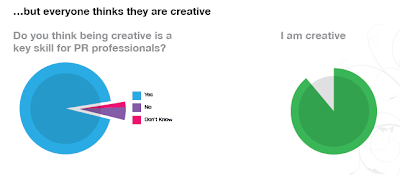Apparently the PR industry is lacking creativity, which is
considered a serious problem. The roadblocks to creativity include small
budgets, lack of time and staff being overworked. The interesting paradox
apparent in this study’s results is that the PR professionals surveyed for this
study thought they were themselves were creative, but that the industry wasn’t.
This shows disconnect and inconsistency (how can a high % of people surveyed be
creative but the industry isn’t?). But maybe the most important finding from
this study is that PR professionals think creativity is necessary in the
profession. So what is the take-away? Creativity is something all PR
professional should strive for because it is necessary and it may not be as
nurtured or encouraged as necessary. This is definitely a challenge PR students
should be aware of before starting a career in PR.Check out the Study.
2) Can creativity be taught?
I love this post that argues that creativity cannot be
taught. Why you ask? Because, creativity is something that distinguishes real
PR pros from the rest of the business world. To recap the main argument of the
article, creativity is elusive and not well-defined in the profession. This
makes it challenging to teach as there is no benchmark. So what to do for those
lacking in the creativity department? The author believes that creativity can
be elevated in people who show a spark and it can be fostered in people who
appear to be uncreative. Let’s remember creativity is subjective and dependent
on the type of organization. For fellow PR students, I suggest that you express
your unique type of creativity while adapting it to the industry that you want
to work in. Don’t be afraid to show that you are creative even as a PR newbie,
because it shows you have the aptitude and that you are worth the investment
that will elevate you in your job. View the post.
3) Do creativity and strategy go hand-in-hand?
Super important point here: Creativity is not complete
without strategy! You have a great idea? Nice. Now what? Have any ideas on how
to execute it? How it will address your clients need? Does it fit with their
brand? These are things that a lot of PR newbies don’t necessarily think about
when asked to come up with a PR tactic. I know this because I have seen it.
That being said strategizing is something that can be taught, whether it
through a business program or a PR postgrad. For PR students, this is something
to consider if you want to be successful in PR. Read the article.
4) The Creativity Paradox
The last point I will touch on creativity in this post is:
Is creativity truly rewarded. The study above mentioned it is something that the
PR profession needs, but do creative ideas win out over practical ones. There
may in fact be a covert fear of creativity in that it can sometimes be
rejected. But why? Namely because ideas that are tried and true are so solid
that why would we mess with something that works? Well namely because those
ideas came from creativity somewhere down the line and somewhere in the future
they won’t be enough. It is always a good idea to strive for something new, even
if only applying creativity to a solid existing tactic. For PR students this
means we must be cautious not to overstretch our creative side and to always
remember that PR strategies need to have tangible results even if they aren’t
fancy. Read about it here.
Again all the links are here:
You may also like: The Creativity Index
What do you think is the future of creativity in PR? Why do you this is important? Let me know what you think by commenting below.
P.S. I love PR


